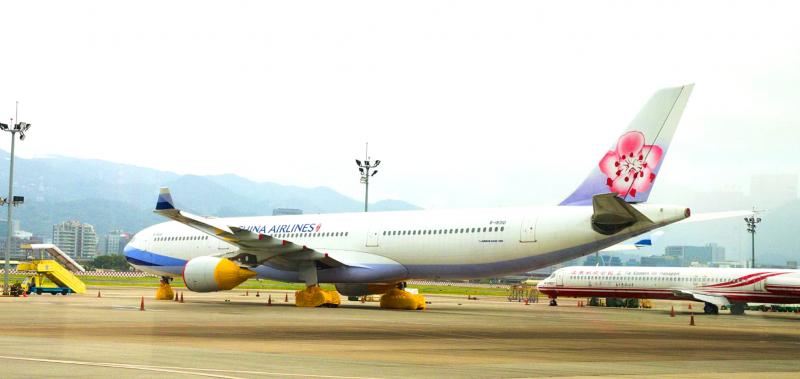The Civil Aeronautics Administration yesterday announced that the aviation fuel surcharge would be reduced to NT$0 due to tumbling international aviation fuel prices, adding that the new measure would take effect on Sunday.
It would be the first time that international flight passengers would not have to pay the surcharge, which is included in air fares, since the agency allowed Taiwanese airlines to charge it in July 2004.
Aviation industry observers said that reducing the surcharge is not likely to boost to the flagging travel and aviation industries, as many people are refraining from traveling overseas for fear of contracting COVID-19.

Photo courtesy of China Airlines
For airlines to charge the surcharge, the international aviation fuel price has to be more than US$40 per barrel, the agency added.
However, CPC Corp, Taiwan (CPC, 台灣中油) announced last week that the international aviation fuel price had dropped to US$29.62 per barrel, which does not meet the requirement for airlines to charge customers a fuel surcharge.
Passengers on international flights would need to pay the surcharge if the aviation fuel price rises above US$40 per barrel, the agency said, adding that the amount each international passenger would have to pay would be adjusted to reflect changes to the fuel price.
Agency records showed that the aviation fuel surcharge peaked in June 2008, when short-haul passengers were charged US$32.50 per aviation segment and long-haul passengers paid US$84.50 per aviation segment.
In March, the surcharges for short-haul and long-haul flights were US$12.50 and US$32.50 per aviation segment respectively, the agency’s records showed.
However, the surcharges last month dropped to US$5 and US$13 respectively.

EUROPEAN TARGETS: The planned Munich center would support TSMC’s European customers to design high-performance, energy-efficient chips, an executive said Taiwan Semiconductor Manufacturing Co (TSMC, 台積電), the world’s largest contract chipmaker, yesterday said that it plans to launch a new research-and-development (R&D) center in Munich, Germany, next quarter to assist customers with chip design. TSMC Europe president Paul de Bot made the announcement during a technology symposium in Amsterdam on Tuesday, the chipmaker said. The new Munich center would be the firm’s first chip designing center in Europe, it said. The chipmaker has set up a major R&D center at its base of operations in Hsinchu and plans to create a new one in the US to provide services for major US customers,

The Ministry of Transportation and Communications yesterday said that it would redesign the written portion of the driver’s license exam to make it more rigorous. “We hope that the exam can assess drivers’ understanding of traffic rules, particularly those who take the driver’s license test for the first time. In the past, drivers only needed to cram a book of test questions to pass the written exam,” Minister of Transportation and Communications Chen Shih-kai (陳世凱) told a news conference at the Taoyuan Motor Vehicle Office. “In the future, they would not be able to pass the test unless they study traffic regulations

GAINING STEAM: The scheme initially failed to gather much attention, with only 188 cards issued in its first year, but gained popularity amid the COVID-19 pandemic Applications for the Employment Gold Card have increased in the past few years, with the card having been issued to a total of 13,191 people from 101 countries since its introduction in 2018, the National Development Council (NDC) said yesterday. Those who have received the card have included celebrities, such as former NBA star Dwight Howard and Australian-South Korean cheerleader Dahye Lee, the NDC said. The four-in-one Employment Gold Card combines a work permit, resident visa, Alien Resident Certificate (ARC) and re-entry permit. It was first introduced in February 2018 through the Act Governing Recruitment and Employment of Foreign Professionals (外國專業人才延攬及雇用法),

‘A SURVIVAL QUESTION’: US officials have been urging the opposition KMT and TPP not to block defense spending, especially the special defense budget, an official said The US plans to ramp up weapons sales to Taiwan to a level exceeding US President Donald Trump’s first term as part of an effort to deter China as it intensifies military pressure on the nation, two US officials said on condition of anonymity. If US arms sales do accelerate, it could ease worries about the extent of Trump’s commitment to Taiwan. It would also add new friction to the tense US-China relationship. The officials said they expect US approvals for weapons sales to Taiwan over the next four years to surpass those in Trump’s first term, with one of them saying